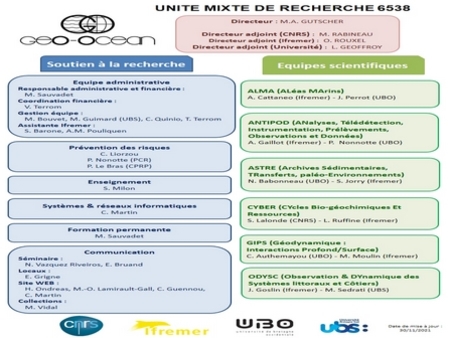The mandate and scope of activities of Ifremer in the field of marine materials
When it was created in 1967, the missions of the CNEXO (Centre National pour l’Exploitation des Océans), were defined in five themes, including "Mineral and fossil resources". The mandate included « studies and research aimed at exploiting the resources contained in their mass, soil, and subsoil ».
In 1969, the "Marine sand and gravel" programme was initiated to take stock of available material resources on the French continental shelf. Initially, in metropolitan France, it then spread to the West Indies from 1985.
The programme was pursued by Ifremer created in 1984 when the CNEXO merged with the ISTPM (Institut Scientifique et Technique des Pêches Maritimes) (Decree 84-428 of 5 June 1984).
A national inventory of marine aggregates was carried out from 1969 to 1981. In a joint initiative between Ifremer and local and regional authorities, a regional inventory followed: Nord-Pas de Calais (1984-1986, siliceous aggregates), Brittany (1987-1990, maërl), Guadeloupe (1985-1992, siliceous aggregates), Martinique (in progress).
The recognized resources in Metropolitan France have been estimated at 33 billion m3 of which 600 million are considered exploitable reserves. Favourable sites for material exploitation were subsequently identified.
Proven resources in Metropolitan France have been estimated at 33 billion m3 of which 600 million are considered exploitable reserves. Favourable sites for material exploitation were subsequently identified.
Ifremer acts as scientific and technical advisor to public decision-makers (ministries, prefectures, decentralized State services) to provide advice on applications for permits to exploit or explore marine materials (Decree 71-360 of 6 May 1971, Decree 85-448 of 23 April 1985, Decree 95-427 of 19 April 1995, Decree 95-696 of 9 May 1995, Decree 98-970 of 26 October 1998). The Institute is also associated with the on-going debate that should lead to the revision of statutory regulations.
Ifremer is affiliated with international working groups on "aggregate extraction", such as the ICES working group on "Effects of extraction of marine sediments on the marine ecosystem" and EMSAGG (European Marine Sand and Gravel Group), and is involved in European programmes (Interreg).
Ifremer is increasingly called upon in its capacity as a national establishment involved in research programmes and developing expertise on the multiple effects of material extraction on habitats (nature of the seabed, associated flora, and fauna) thanks to its renowned multidisciplinary research work in geology-sedimentology, modelling, marine biology and monitoring of fishing activities.
In 2001, Ifremer created an expertise committee to organize its scientific and technical advisory work, maintaining its relations with public decision-makers, local authorities, other users of the sea (including fishermen and extractors) and society in general. This relational component will be essential in the future since the very likely development of marine extractions will raise serious questions of territorial competition between users of the sea but also of the real impact on the biological functionality of the seabed already undergoing serious risks.

